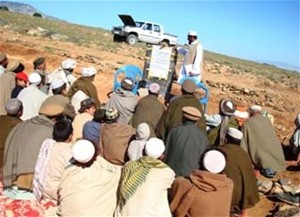Home » Reports & Data » Progress » Transforming Lives » Government Officials Deliver Agricultural Services

A government trainer demonstrates how to identify common livestock illnesses.
USAID/Afghanistan
Local governments help save livestock.
30 DECEMBER 2008 | WADISAR VILLAGE, NANGARHAR
Two livestock trainers from the Ministry of Agriculture, Irrigation and Livestock (MAIL) have helped build relationships with community members by offering a one-month Livestock Management training course for 40 farmers in the isolated Wadisar village of Nangarhar province.
Local farmers say the government trainers shed new light on both livestock management and basic community health. “Ten years back my goats were killed by some anonymous disease” explained one trainee, “My family had eaten meat from one of the dead animals. The same week my wife became suddenly sick and died. Now I know my wife was killed by the disease known as Anthracnose. We have learned not to eat diseased meat during our training course.”
Wadisar village is 70 kilometers from the nearest provincial city center, Jalalabad. Livestock numbers in the village have steadily decreased in recent years due to drought, with the average sheep ownership falling from 22 per family to three. Hoping to regenerate natural cattle and sheep herds, the local Community Development Committee requested assistance from the United States Agency for International Development (USAID) in early 2008.
The Ministry for Agriculture, Irrigation and Livestock, in partnership with USAID, assigned two livestock experts to conduct informal farmer-to-farmer training in livestock management. The ministry staff also trained the Wadisar farmers in dairy cattle feeding, veterinary services, common livestock diseases, disease prevention and how to increase household incomes.
This project has helped to enhance the legitimacy of the local government by enabling government staff to deliver essential agricultural services in remote areas where communities have rarely had the opportunity to meet government officials.
The subproject comes as part of the USAID local governance and community development project that aims to strengthen the local government’s capacity to deliver basic services.







Comment
Make a general inquiry or suggest an improvement.